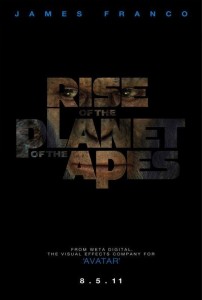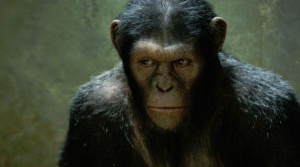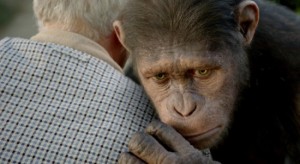 Renn Brown: Kind of hard not to roll your eyes when you think of Hollywood rebooting one of the most inherently silly science fiction series there is, and this time even making it an origin story utterly reliant on CGI! Who could have predicted they’d end up producing one of the better films of the year– one that utterly transcends its source franchise and shows what a sophisticated blockbuster is capable of achieving. It’s not perfect, but Rise of the Planet of the Apes is an excellent piece of science fiction that is brave, bold, and delicate in equal measure, and the best kind of action movie: one that imbues each moment of spectacle with distinct purpose that serves its characters. And no character is better served than Caesar- a remarkable creation of man and computer that will certainly be measured among the great synthetic heroes of film. He’s the living result of a man’s quest to conquer nature, the clenched fist of an unforeseen revolution, and the beating heart of very modern, very good movie.
Renn Brown: Kind of hard not to roll your eyes when you think of Hollywood rebooting one of the most inherently silly science fiction series there is, and this time even making it an origin story utterly reliant on CGI! Who could have predicted they’d end up producing one of the better films of the year– one that utterly transcends its source franchise and shows what a sophisticated blockbuster is capable of achieving. It’s not perfect, but Rise of the Planet of the Apes is an excellent piece of science fiction that is brave, bold, and delicate in equal measure, and the best kind of action movie: one that imbues each moment of spectacle with distinct purpose that serves its characters. And no character is better served than Caesar- a remarkable creation of man and computer that will certainly be measured among the great synthetic heroes of film. He’s the living result of a man’s quest to conquer nature, the clenched fist of an unforeseen revolution, and the beating heart of very modern, very good movie.
Nick Nunziata: It is modern, but not foolishly so. There’s definitely a foot planted in the past here and the biggest asset Rise of the Planet of the Apes has is that it doesn’t skimp on character beats and nuance over spectacle. In fact, what may feel like a failing to some is one of the things that helps elevate the movie. Its big action set piece comes very late in the game and it isn’t the focal point of the movie. It’s more of a means to an end and one that doesn’t wholly connect to the dots to the events of the Charlton Heston classic. Caesar is definitely the star of the film but he’d have just been a tech marvel if the actual human characters were weak and luckily James Franco does a very good job of delivering a performance that makes the time spent away from the simians worthwhile. He’s believable as a scientist trying both to create a drug that improves the world but also a son willing to bend the rules, consequences be damned, to help his ailing father (John Lithgow). The film begins late in the stages of testing of a product intended to cure Alzheimer’s Disease with the various primates being tested on beginning to show potential. Especially Bright Eyes, a female whose intelligence has skyrocketed. Shortly after convincing the firm funding the science approves an escalation towards human testing something goes wrong and Bright Eyes wreaks havoc on the lab. The only positive evidence of the career threatening event is the small male child she was carrying in her womb. Caesar.
Renn: And it’s when Caesar begins to grow up that you realize you’re watching a movie with passion and vision behind it, one with a story to tell. This is not a refresher of WETA’s effects reel, but their innovations that have taken motion capture out of the studio and in to the real world do much to bridge the gap between the photo-real effects and the merely great effects. What makes it all matter though, is that every pixel of these creations have been rendered in service of merging the very real bones of the performances from the various ape actors with the digital muscles and flesh that have been layered on top of them. The marriage is always impressive, and very often magical. A performance from Andy Serkis that touches every emotion in the book is the stand-out, but Caeser is not the only ape with an arc– there are at least four or five other distinct creatures that get their due.
Beautiful effects and even well-translated performances would matter little if they were a part of a big dumb summer circus, but fortunately Rise of the Planet of the Apes tells a powerful science fiction story, with a clever structure. James Franco’s Will Rodman leads the film as we are introduced to the circumstances of the story, but soon hands off his role as the primary protagonist to a growing Caeser. What the film is clever enough to do though, is complete Will’s arc before the film kicks into high gear. It’s a very sophisticated dance of focus between two characters, and your usual blockbuster would simply leave Rodman behind or continue lazily servicing his story throughout the entire film, shoehorning his resolution in at the end. The filmmaker’s choices here represent an attention to detail that is present in virtually every aspect of the film, and the kind of care that rarely goes into a movie like this. As for the science fiction component, the film combines two well-trodden themes: the idea of a scientist refusing to accept death as a necessary part of life, and the idea that man’s technological/medical hubris will ultimately be its downfall. The film breaks new ground with neither, but the way they are merged gives the film a strong scifi spine and sets the stage for Caesar to take a resonating emotional journey.
Nick: It’s very successful at delivering that payoff but there are a few hiccups. All of the work that goes into the nuance and authenticity of populating the film with animals you can believe as real (they didn’t use one real ape in the film) is sometimes betrayed in the action sequences where it’s apparent that the filmmakers remembered they’re making a big budget summer movie. There’s a few too many hero poses and moments of action that look cool but don’t serve the intent of delivering totally believable living things. It’s few and far between and since the success of this film will determine if we see another “of the Apes” installment it’s only fair. This film is surprisingly epic in many ways, and though the actual structure and story makes it feel more like a November release rather than an August one.

Renn: They definitely turn the apes into action heroes, which is earned by virtue of what you see them endure, but certainly treads the line from time to time. The action is all well shot though, and one of the less talked-about tech pushes in the film is the use of an extremely dynamic camera that capitalizes on the nature of the digitized performance (which can ultimately be shown from all angles) to pull some aggressive shots. Fortunately Rupert Wyatt and his team understand that our brains know what a camera can and can not do, so the moves are still weighted with a sense of gravity and momentum that keeps them from reading as ostentatiously fake. Mix that with stunning sound design (with special kudos to the vocal editors and mixers, who handle the grunts and hoots of the apes very well), and you’ve got a senses-pleasing action experience that fully commits once the gates are opened. Fortunately the film doesn’t abandon its thematic ideas when the chaos hits, so each beat amongst the spectacle serves some sort of purpose (even if some is indeed posed melodramatically).
My biggest issue with the film is the under-written villain role played by Tom Felton. For a film that has such well-rendered characters then played so nicely by Franco, Lithgow, and Serkis, this key human villain feels very two-dimensional. It’s easy to detect there was some sort of father-son parallel with Will and Caesar contrasting against the characters played by Felton and Brian Cox in the writer’s head, but it never rings true. Ultimately the character is a catalyst for Caesar’s turn into full revolutionary though, and Caesar’s time with other apes is so perfect that it overshadows the flaws of the human contributions.
Nick: Felton isn’t underwritten. He’s not written. He’s a bad photocopy of a worn-out template. It’s a huge mistake in a film that makes so many good character decisions. The only thing missing is a curly mustache and a black hat. Also, while I understand it’s wise to pay respects to the original film and its impact there are a few moments meant to be little Easter Eggs for discerning audiences (images on a TV screen, one over-emphasized line of dialogue) it just feels wrong. These are little gripes though. There is an awful lot to like here and for audiences looking for a nice character based event film that sets the stage for larger things this is a huge surprise for August. A gift really.
Renn alluded to “hero” characters in the ape contingent and it’s probably odd but there’s a character here who almost feels like Stripe from Gremlins. That’s an acute accomplishment, as many films create all sorts of visual splendor in fantastical, photoreal creatures and then spend the majority of the time making them scowl or growl or perform one of a handful of routine mannerisms. The “Stripe” ape allows for viewers to still find a humanity in caesar even after he’s become corrupted by his infernal desire to battle the oppression he feels he’s up against. It’s a nice little touch.
Renn: As much as I agree that the big silly easter egg/reference is less than graceful, I will say it’s immediately overshadowed by a moment I never thought to expect from the film, but was impressed when it happened. I won’t spoil the moment, but Caesar makes a well-timed advancement that actually touched and frightened me simultaneously. From there, the handling of the larger plot connection to the source material is deftly left open for more tales, yet it feels complete as its own story, and gracefully alludes to events to come rather than poorly cramming them in. The film doesn’t cheapen out at the last second though, as it pushes its climax as large as would ever make sense in the context of the story, and allows a relatively small-scale uprising to act as a reduced scale harbinger of what is to come. It works great.
It’s hard to imagine a much better approach to a rebroot/prequel to a franchise than this. It says a lot that the film would only have had to refine elements that were already present to come closer to being a classic popcorn movie. As it is, we have a truly great blockbuster, solid piece of science fiction, and a stunning bit of character work to enjoy. Rise of the Planet of the Apes is the best blockbuster of the year, and surely the biggest surprise of 2011 so far. If Hollywood is gong to continue exploiting every cultural property it can get its hands on, it should take a long look at Rise of the Planet of the Apes and consider what was done right. Studios take note: THIS is how you add to a classic franchise.
Nick: Time will tell. I’m not sure it’ll hold up on repeat viewings. This is a solid, strong, and very able flick. It’s blood from a stone, because no one really asked for this film. On those merits, the excellent creation of Caesar, and the often use of restraint from the filmmakers (Rupert Wyatt is very good), it’s a winner. I don’t think it’s going to be a hit and I’m not sure the average moviegoer is going to buy into it, but it’s a worthy prequel to Pierre Boulle’s seminal book. This is how you make a prequel. This is how you tell an old story with today’s toolbox. It’s not perfect but it’s damn good and the kind of film that’s going to lodge a few words in the throats of the cynics.
Renn:
Rating: 




Out of a Possible 5 Stars
Nick:
Rating: 




Out of a Possible 5 Stars
